Three years in the making, Out North, An Archive of Queer Activism and Kinship in Canada, published by The ArQuives and Figure.1 Publishing, is now available online and in bookstores across Canada. Authors Craig Jennex and Nisha Eswaran will be scheduled for book signings later in the year. The following article is one of a series of texts to be published about this amazing survey of Activism and Kinship. Before the COVID-19 shutdown, volunteer Scott Anderson sat down with Craig and Nisha to discuss some of the intriguing material – and people – they discovered while working on the project. The following interview has been edited and condensed.
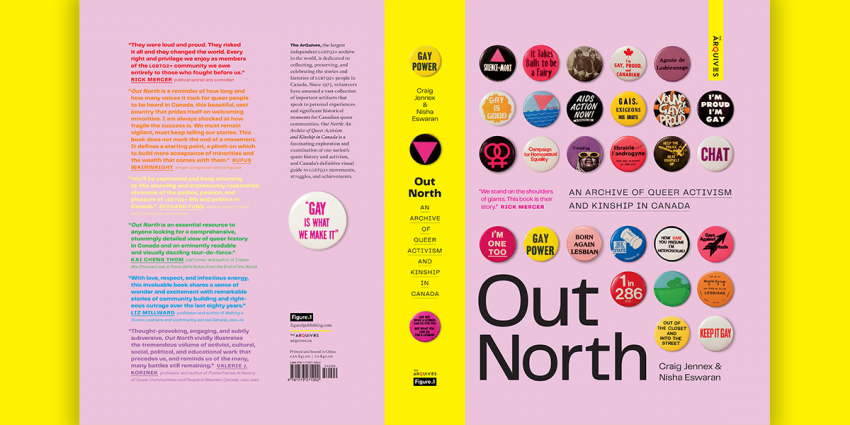
Interview by Scott Anderson
How did the book get started?
Craig: The idea was to bring The ArQuives collection to broader audiences – and into their homes. There’s so much amazing stuff that so few people know about.
SA: The subtitle mentions “kinship.” That’s an unusual word choice…
Nisha: We felt it was important not to just mine the collection for just interesting things but to look for ways that people supported each other through gay liberation – especially how queer activism was supportive of racial and social justice.
Craig: Also, through working on the book, we developed a real sense of kinship to people we had never met.
Like who?
Nisha: For me, the Van Dykes. They were a group of lesbians in Ontario in the late-1970s who got in a van and went on the road in Canada and the U.S. looking for lesbian utopia. Some of them legally changed their last name to Van Dyke. They picked people up on the way and dropped people off when they’d had enough. One of them, Ange Spalding (who died in 1990), donated the journal she wrote during that adventure to The ArQuives. There was something really profound about reading her handwritten notes as she worked through heartbreak, or polyamory or coming out to her parents.
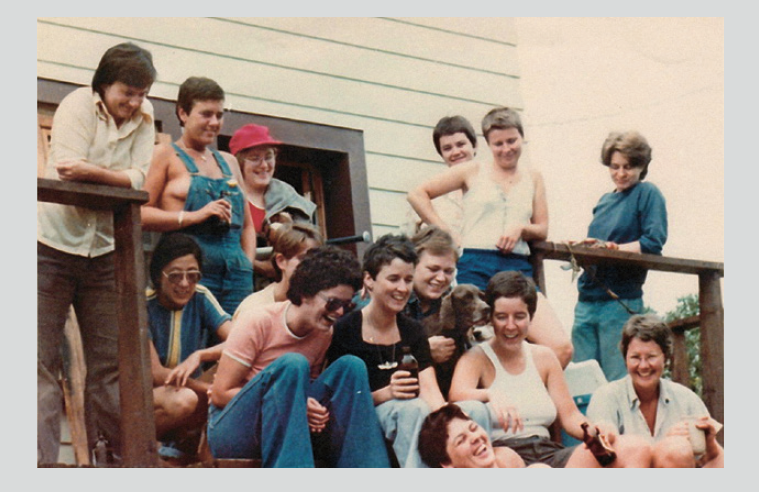
Women on the back porch of The Farm, Cavan, Ontario, 1977. Front: Lamar Van Dyke; second row, from left: Pam Godfrey, Artemis Pallas, Guy (holding dog), Alison Fraser, Vicki Treirse; third row, from left: Jeannie, Nia (mostly hidden); back row, from left: Jen, Ange Spalding, BJ Danylchuk, Judith Zutz, Chris Fox, Elby. Photograph by Gerald Hannon.
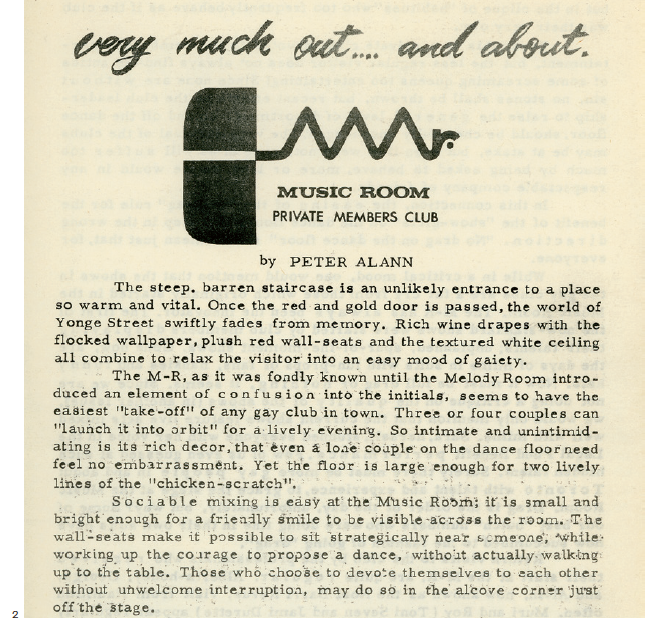
Craig: I was completely captivated by Sara Ellen Dunlop. In the 1960s, Sarah managed The Music Room, a gay bar on Yonge Street just north of Wellesley in Toronto. She took her role as protector seriously: there are stories about her kicking homophobic bashers down the stairs. She would even attend court appearances for men who were arrested at The Music Room for kissing or touching or doing things the city’s morality squad didn’t like. In the mid-1970s, she started her own record label – Sara Ellen’s Homemade Records – and released an album called In The Light and a 45 with two songs. She’s in The ArQuives’ portrait gallery.
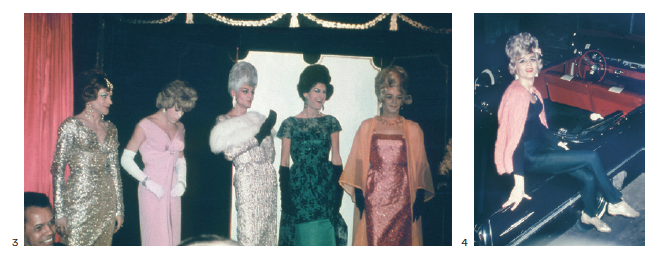
Did you discover anything surprising during your research?
Craig: We think of the bathhouse raids in Toronto as an attack on white gay men, which it was. But we found materials from the time showing how it was also linked with broader issues of police violence, such as the murder of Black citizens by the police. Events tend to be remembered in rigidly defined and segregated ways. But The ArQuives has so much evidence of collaboration, coalition and collectivity.
There’s a lot of great art in the book. What’s your favourite image?
Nisha: For me, it’s an image of two dykes sneaking out of a militarized area. I like it for its cheekiness and for its disregard for military authority. Gay sex on military property seems like an excellent reaction to the war machine and state oppression!
Craig: Mine is a Toronto Star photograph of Eva Halpert, whose son had been diagnosed with AIDS. She’s protesting with her father in front of pharmaceutical company Bristol Myers’ office on Bay Street with a sign that says the company is withholding a drug that could save her son’s life. On the sign is the company’s phone number. I found that very powerful.
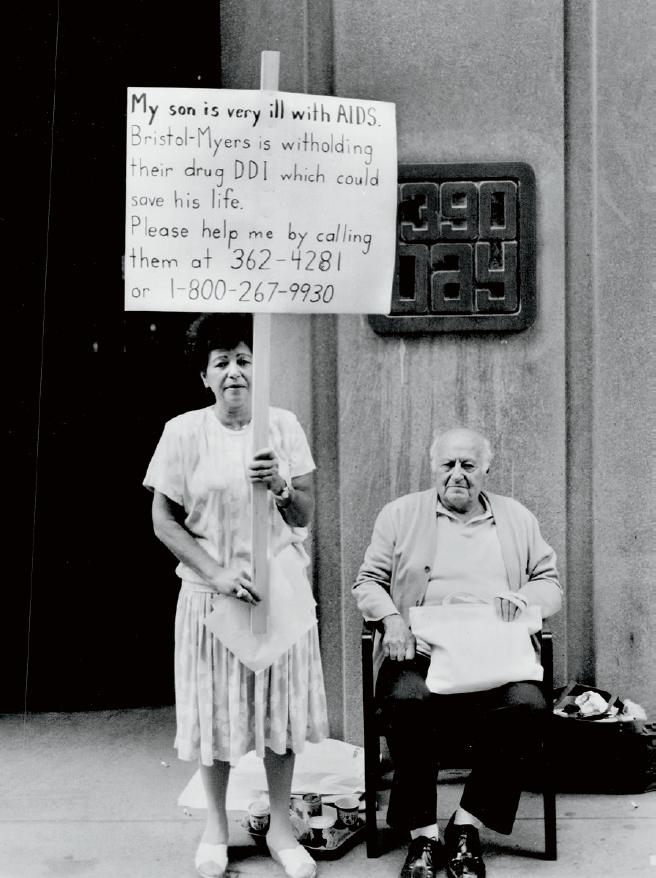
Nisha: That we owe so much to everyone who has been working and volunteering at The ArQuives over the years, and who have managed to build it into the largest independent LGBTQ ArQuives in the world.
Craig Jennex is an assistant professor of English at Ryerson University. Nisha Eswaran is working on her PhD in English and Cultural Studies at McMaster University. Nisha Eswaran is a writer and academic in Toronto, Ontario. Her work has appeared in Postcolonial Text, South Asian Review, Kajal, and Jamhoor. Out North is available now for pre-order on Indigo. It’ll be available in bookstores across Canada on August 11, 2020.

